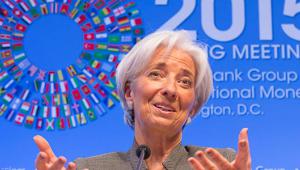In a speech delivered yesterday, Lagarde referred to the changing role of emerging markets in the world’s economy and said it was necessary for all to have a more global perspective to work towards securing growth and prosperity for all.
“A new economic reality has slowly emerged as countries have developed and grown richer. And now that some of these countries experience difficulties after many years of growth, we are affected by it too. This is not something to fear, but it does require us to be aware and think a bit differently, a bit more multilaterally.
“By forging a new partnership, by strengthening what I have called a ‘new multilateralism’, we can create a more prosperous and more peaceful future for everybody,” she said.
Lagarde said that as the world’s advanced economies have come to rely on emerging markets as destinations for investments and as customers for products, their health is coming to have a greater impact through trade, finance and geopolitical linkages.
This means a “two-way street of unintended knock-on effects” with actions in one country spilling over to others, in turn creating negative feedback on the country that started the process.
“Emerging markets have reached a size where such effects are big enough to be felt everywhere,” Lagarde said, impacting global finance, trade and economies. Environmental spillovers could also be a feature of the future if carbon-intensive infrastructure is locked into the developing world’s rapid urbanisation and its mega-cities.
She stressed the increasing interplay between emerging and advanced economies, and urged both to be more aware of the effects they have on each other, their interdependence, and how they can work together, especially as emerging markets endure a harsh slowdown in the growth they have enjoyed in the past.
Lagarde said “it takes two to grow”, and argued that action is needed by both advanced and emerging economies.
Emerging economies should upgrade the efficiency of spending, strengthen fiscal institutions, increase non-commodity revenues and allow for greater exchange rate flexibility to help soften the impact of adverse external shocks.
The use of macroprudential tools to limit financial sector risks – either by monitoring foreign currency debt or limiting the fallout from large credit expansion – also needs to be scaled up in many cases, she added.
As for advanced economies, Lagarde said those with budgetary room to do so should use fiscal policy to stimulate their economies, support demand and communicate changes to policy prudently and effectively.
The US has a special responsibility at the moment as it normalises monetary policy, she noted, as this can be a source of global spillovers.
Both emerging and advanced economies need to address the underlying economic issues that are fundamental to boosting growth and promoting sustainable income convergence, she continued.
This means fostering more and better innovation, facilitating a greater sharing of technology and completing the global regulatory reform agenda towards a more resilient global financial system.
She also called for a “global policy upgrade”, highlighting that a “smart retooling” towards safer capital flows and a stronger global financial safety net would be beneficial for all.
The IMF chief added that leaders and policymakers should also play a part by highlighting climate change awareness, the dangers of excessive inequality and insisting on the highest ethical standards in all walks of life.












